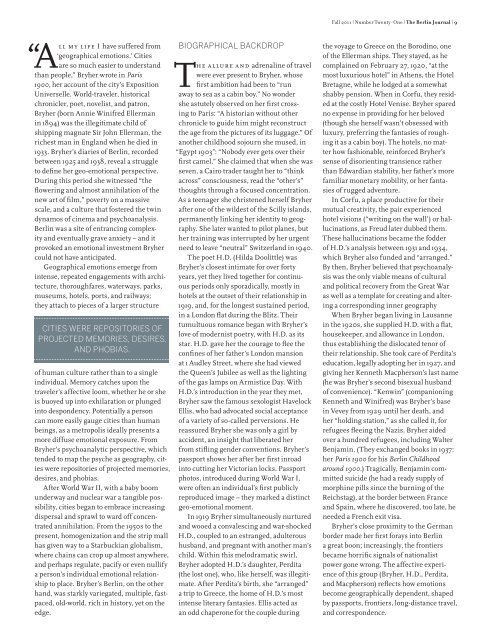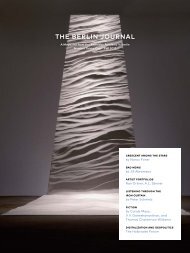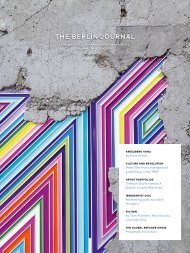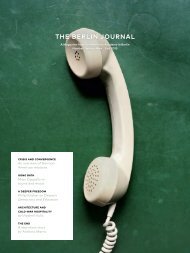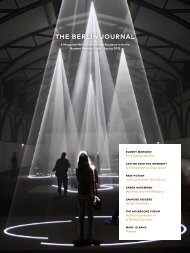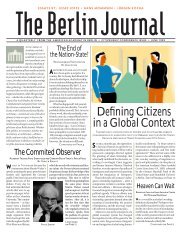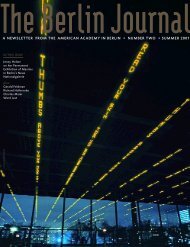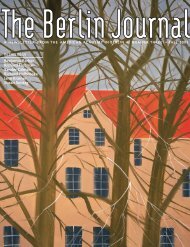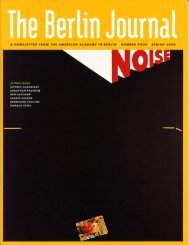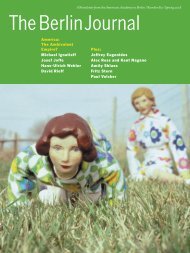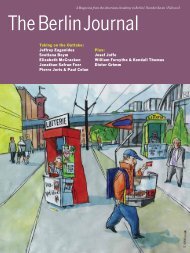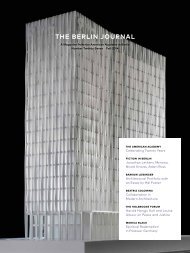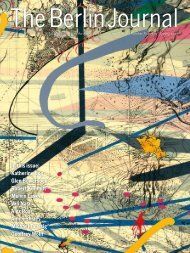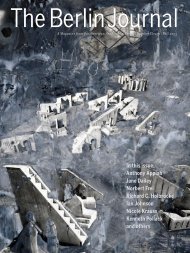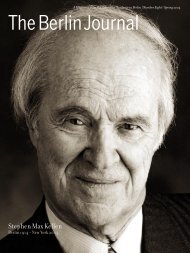Fall 2011 | Issue 21
- No tags were found...
You also want an ePaper? Increase the reach of your titles
YUMPU automatically turns print PDFs into web optimized ePapers that Google loves.
<strong>Fall</strong> <strong>2011</strong> | Number Twenty-One | The Berlin Journal | 9<br />
my life I have suffered from<br />
‘geographical emotions.’ Cities<br />
“All<br />
are so much easier to understand<br />
than people,” Bryher wrote in Paris<br />
1900, her account of the city’s Exposition<br />
Universelle. World-traveler, historical<br />
chronicler, poet, novelist, and patron,<br />
Bryher (born Annie Winifred Ellerman<br />
in 1894) was the illegitimate child of<br />
shipping magnate Sir John Ellerman, the<br />
richest man in England when he died in<br />
1933. Bryher’s diaries of Berlin, recorded<br />
between 1925 and 1938, reveal a struggle<br />
to define her geo- emotional perspective.<br />
During this period she witnessed “the<br />
flowering and almost annihilation of the<br />
new art of film,” poverty on a massive<br />
scale, and a culture that fostered the twin<br />
dynamos of cinema and psychoanalysis.<br />
Berlin was a site of entrancing complexity<br />
and eventually grave anxiety – and it<br />
provoked an emotional investment Bryher<br />
could not have anticipated.<br />
Geographical emotions emerge from<br />
intense, repeated engagements with architecture,<br />
thoroughfares, waterways, parks,<br />
museums, hotels, ports, and railways;<br />
they attach to pieces of a larger structure<br />
CITIES WERE REPOSITORIES OF<br />
PROJECTED MEMORIES, DESIRES,<br />
AND PHOBIAS.<br />
of human culture rather than to a single<br />
individual. Memory catches upon the<br />
traveler’s affective loom, whether he or she<br />
is buoyed up into exhilaration or plunged<br />
into despondency. Potentially a person<br />
can more easily gauge cities than human<br />
beings, as a metropolis ideally presents a<br />
more diffuse emotional exposure. From<br />
Bryher’s psychoanalytic perspective, which<br />
tended to map the psyche as geography, cities<br />
were repositories of projected memories,<br />
desires, and phobias.<br />
After World War II, with a baby boom<br />
underway and nuclear war a tangible possibility,<br />
cities began to embrace increasing<br />
dispersal and sprawl to ward off concentrated<br />
annihilation. From the 1950s to the<br />
present, homogenization and the strip mall<br />
has given way to a Starbuckian globalism,<br />
where chains can crop up almost anywhere,<br />
and perhaps regulate, pacify or even nullify<br />
a person’s individual emotional relationship<br />
to place. Bryher’s Berlin, on the other<br />
hand, was starkly variegated, multiple, fastpaced,<br />
old-world, rich in history, yet on the<br />
edge.<br />
BIOGRAPHICAL BACKDROP<br />
The allure and adrenaline of travel<br />
were ever present to Bryher, whose<br />
first ambition had been to “run<br />
away to sea as a cabin boy.” No wonder<br />
she astutely observed on her first crossing<br />
to Paris: “A historian without other<br />
chronicle to guide him might reconstruct<br />
the age from the pictures of its luggage.” Of<br />
another childhood sojourn she mused, in<br />
“Egypt 1903”: “Nobody ever gets over their<br />
first camel.” She claimed that when she was<br />
seven, a Cairo trader taught her to “think<br />
across” consciousness, read the “other’s”<br />
thoughts through a focused concentration.<br />
As a teenager she christened herself Bryher<br />
after one of the wildest of the Scilly islands,<br />
permanently linking her identity to geography.<br />
She later wanted to pilot planes, but<br />
her training was interrupted by her urgent<br />
need to leave “neutral” Switzerland in 1940.<br />
The poet H.D. (Hilda Doolittle) was<br />
Bryher’s closest intimate for over forty<br />
years, yet they lived together for continuous<br />
periods only sporadically, mostly in<br />
hotels at the outset of their relationship in<br />
1919, and, for the longest sustained period,<br />
in a London flat during the Blitz. Their<br />
tumultuous romance began with Bryher’s<br />
love of modernist poetry, with H.D. as its<br />
star. H.D. gave her the courage to flee the<br />
confines of her father’s London mansion<br />
at 1 Audley Street, where she had viewed<br />
the Queen’s Jubilee as well as the lighting<br />
of the gas lamps on Armistice Day. With<br />
H.D.’s introduction in the year they met,<br />
Bryher saw the famous sexologist Havelock<br />
Ellis, who had advocated social acceptance<br />
of a variety of so-called perversions. He<br />
reassured Bryher she was only a girl by<br />
accident, an insight that liberated her<br />
from stifling gender conventions. Bryher’s<br />
passport shows her after her first inroad<br />
into cutting her Victorian locks. Passport<br />
photos, introduced during World War I,<br />
were often an individual’s first publicly<br />
reproduced image – they marked a distinct<br />
geo-emotional moment.<br />
In 1919 Bryher simultaneously nurtured<br />
and wooed a convalescing and war-shocked<br />
H.D., coupled to an estranged, adulterous<br />
husband, and pregnant with another man’s<br />
child. Within this melodramatic swirl,<br />
Bryher adopted H.D.’s daughter, Perdita<br />
(the lost one), who, like herself, was illegitimate.<br />
After Perdita’s birth, she “arranged”<br />
a trip to Greece, the home of H.D.’s most<br />
intense literary fantasies. Ellis acted as<br />
an odd chaperone for the couple during<br />
the voyage to Greece on the Borodino, one<br />
of the Ellerman ships. They stayed, as he<br />
complained on February 27, 1920, “at the<br />
most luxurious hotel” in Athens, the Hotel<br />
Bretagne, while he lodged at a somewhat<br />
shabby pension. When in Corfu, they resided<br />
at the costly Hotel Venise. Bryher spared<br />
no expense in providing for her beloved<br />
(though she herself wasn’t obsessed with<br />
luxury, preferring the fantasies of roughing<br />
it as a cabin boy). The hotels, no matter<br />
how fashionable, reinforced Bryher’s<br />
sense of disorienting transience rather<br />
than Edwardian stability, her father’s more<br />
familiar monetary mobility, or her fantasies<br />
of rugged adventure.<br />
In Corfu, a place productive for their<br />
mutual creativity, the pair experienced<br />
hotel visions (“writing on the wall’) or hallucinations,<br />
as Freud later dubbed them.<br />
These hallucinations became the fodder<br />
of H.D.’s analysis between 1931 and 1934,<br />
which Bryher also funded and “arranged.”<br />
By then, Bryher believed that psychoanalysis<br />
was the only viable means of cultural<br />
and political recovery from the Great War<br />
as well as a template for creating and altering<br />
a corresponding inner geography<br />
When Bryher began living in Lausanne<br />
in the 1920s, she supplied H.D. with a flat,<br />
housekeeper, and allowance in London,<br />
thus establishing the dislocated tenor of<br />
their relationship. She took care of Perdita’s<br />
education, legally adopting her in 1927, and<br />
giving her Kenneth Macpherson’s last name<br />
(he was Bryher’s second bisexual husband<br />
of convenience). “Kenwin” (companioning<br />
Kenneth and Winifred) was Bryher’s base<br />
in Vevey from 1929 until her death, and<br />
her “holding station,” as she called it, for<br />
refugees fleeing the Nazis. Bryher aided<br />
over a hundred refugees, including Walter<br />
Benjamin. (They exchanged books in 1937:<br />
her Paris 1900 for his Berlin Childhood<br />
around 1900.) Tragically, Benjamin committed<br />
suicide (he had a ready supply of<br />
morphine pills since the burning of the<br />
Reichstag), at the border between France<br />
and Spain, where he discovered, too late, he<br />
needed a French exit visa.<br />
Bryher’s close proximity to the German<br />
border made her first forays into Berlin<br />
a great boon; increasingly, the frontiers<br />
became horrific signals of nationalist<br />
power gone wrong. The affective experience<br />
of this group (Bryher, H.D., Perdita,<br />
and Macpherson) reflects how emotions<br />
become geographically dependent, shaped<br />
by passports, frontiers, long-distance travel,<br />
and correspondence.


